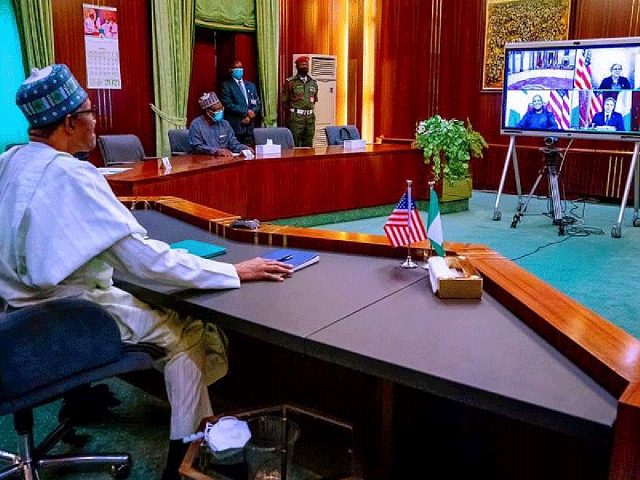President Muhammadu Buhari, on Tuesday, reached out to the United States and other important and strategic partners for help in combating the worsening security challenges facing Nigeria.
Buhari, during a virtual meeting with the US Secretary of State, Mr. Antony Blinken, said the support is necessary because untamed insecurity in Nigeria will have dire consequences for her neighbours and many other countries.
His plea for help came three days after Nobel Laureate, Prof. Wole Soyinka, cried out about the endless martyrdom of the youth in the country and called on the president to seek help to combat terrorism, banditry and kidnapping.
Speaking on the same subject, British Minister for Africa, Mr. James Duddridge, at a meeting with Nigeria’s Minister of Foreign Affairs, Chief Geoffrey Onyema, said the disturbing trend of violence unleashed on Nigerians by Boko Haram sect and allied terror groups is a complex phenomenon that would require varied approaches to resolve.
The security crisis also engaged the attention of the National Assembly with the House of Representatives demanding a state of emergency in the sector.
In the Senate, many senators fumed over the worsening insecurity and mandated its leadership to book an appointment with the president and service chiefs to discuss the issue and proffer solutions.
Former Vice President Atiku Abubakar and a former President of the Senate, Dr. Bukola Saraki, were also on hand yesterday to proffer solutions to the security challenges hemming in the country.
Buhari, during the virtual meeting with Blinken, canvassed the support of the international community in the moves by Nigeria and the West African sub-region to tackle insecurity to avoid spillovers to other countries.
He also urged the United States to consider relocating the US Africa Command (AFRICOM) from Stuttgart, Germany, to Africa, nearer the theatre of operation.
READ ALSO: 3 Ways Sub-Saharan Africa Can Foster Growth In Her Regions
He said: “The security challenges in Nigeria remain of great concern to us and impacted more negatively, by existing complex negative pressures in the Sahel, Central and West Africa, as well as the Lake Chad Region.
“Compounded as the situation remains, Nigeria and her security forces remain resolutely committed to containing them and addressing their root causes. The support of important and strategic partners like the United States cannot be overstated as the consequences of insecurity will affect all nations hence the imperative for concerted cooperation and collaboration of all nations to overcome these challenges.”
He said the relocation of the AFRICOM, which partners with countries to counter transnational threats, to Africa, would strengthen ongoing efforts to check the insecurity and prevent the likelihood of a spillover if done.
“In this connection, and considering the growing security challenges in West and Central Africa, Gulf of Guinea, Lake Chad region and the Sahel, weighing heavily on Africa, it underscores the need for the United States to consider re-locating AFRICOM headquarters from Stuttgart, Germany to Africa and near the Theatre of Operation,’’ he said.
According to him, Nigeria will enhance collaborations in all forms, with friends and strategic partners to work together for greater security for all, which remain the most significant condition for overcoming existential challenges.
Buhari while congratulating Blinken on his appointment by President Joe Biden, commended the United States for the decision to repeal the immigration restriction known as the “Muslim ban,’’ re-joining the World Health Organisation (WHO) and Paris Agreement on Climate Change.
Blinken said he was pleased to make Nigeria part of his “first virtual visit to Africa,” adding that Nigeria and the US share a lot in bilateral issues.
He stated that he would be delighted to build on the foundation laid over 60 years ago between the two countries.
He listed areas of discussion with Nigeria to include “how to build our economies back after the COVID-19 pandemic, security for vulnerable communities, and climate issues.”














